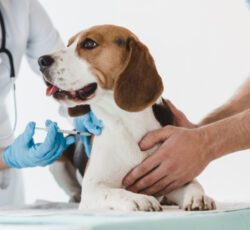The Importance of Vaccinations for Your Pets
 The Importance of Vaccinations for Your Pets
The Importance of Vaccinations for Your Pets
As pet owners, we all want to provide the best possible care for our furry friends. One essential aspect of pet care is ensuring that our pets receive vaccinations. Vaccinations are crucial in helping to protect our pets from a variety of diseases that can cause serious health problems or even be fatal. In this blog post, we will explore the importance of vaccinations for your pets and why regular vaccination is vital for the health and well-being of your beloved pets.
What Are Vaccinations?
Vaccinations are medical interventions that help to protect pets from infectious diseases. They work by introducing a small dose of a disease-causing organism (antigen) into the animal’s body, triggering the immune system’s response to produce antibodies. These antibodies then help to protect the animal against future infection with the same disease-causing organism.
In addition to protecting the individual animal, vaccinations also help to prevent the spread of infectious diseases within communities of pets, making them an essential tool in controlling outbreaks of disease.
Core and Non-Core Vaccinations
Different types of vaccines are available to protect pets from various diseases. Some vaccines are considered core vaccinations, which are recommended for all pets, while others are non-core vaccinations, which may be recommended based on the pet’s lifestyle, environment, and risk factors.
The core vaccinations for cats include:
1. Feline Panleukopenia (FVRCP).
2. Feline Rhinotracheitis virus.
3. Calicivirus.
The core vaccinations for dogs include:
1. Canine Distemper.
2. Canine Adenovirus Type 1 and Type 2.
3. Canine Parvovirus.
4. Rabies.
Non-core vaccinations for pets may include vaccines for diseases such as Bordetella, Leptospirosis, and Lyme disease, which may be recommended based on your pet’s lifestyle, environment, and other risk factors.
Protection from Serious Diseases
Vaccinations are essential in helping to protect pets from serious and potentially life-threatening diseases. For example, Canine Parvovirus is a highly contagious virus that can cause vomiting, diarrhea, dehydration, and even death in dogs. This disease is most common in unvaccinated puppies and young dogs and can be transmitted through contact with infected feces or contaminated environment.
Similarly, Rabies is a severe viral disease that affects the central nervous system of mammals, including humans. It is transmitted through contact with the saliva of an infected animal and can be fatal if left untreated. Vaccination against Rabies is not only a recommended preventive measure for pets but is mandatory by law in many states.
In addition to protecting pets from diseases that can be transmitted to humans, such as Rabies, vaccinations can also help to protect pets from diseases that are specific to their species, such as Feline Leukemia Virus (FLV) in cats.
Cost-Effective Prevention
Vaccinations are a cost-effective preventive measure that can save pet owners significant money in the long run. The cost of a vaccination is relatively low compared to the cost of treating a sick pet. For example, treating a pet with parvovirus can cost several thousand dollars, including hospitalization, supportive care, and medications.
Furthermore, the cost of treating a pet with a serious, infectious disease can extend beyond the cost of medical treatment. It can also include the cost of cleaning and disinfecting the home and environment to prevent the disease from spreading to other pets within the household.
Prevention of Zoonotic Diseases
Zoonotic diseases are diseases that can be transmitted from animals to humans. Vaccinations play a crucial role in preventing the spread of zoonotic diseases by protecting pets from infection and reducing the risk of transmission from pets to humans.
For example, Leptospirosis is an infectious disease that can be transmitted to humans through contact with infected animal urine, soil, or water. Dogs that spend time outdoors, near bodies of water, or in environments where they may come in contact with contaminated soil or water are at increased risk of contracting the disease. Vaccination against Leptospirosis can be an effective preventive measure in protecting dogs and reducing the risk of transmission to humans.
Regular Vaccination
To ensure that pets remain protected from diseases, it is important to maintain a regular vaccination schedule. Regular vaccination is necessary because the duration of immunity provided by vaccines varies depending on the individual animal’s immune response and the disease being vaccinated against.
Additionally, the immunity provided by vaccinations can decline over time, making regular boosters necessary to maintain adequate protection.
Conclusion
Regular vaccination is an essential component of responsible pet ownership. Vaccinations provide protection against a range of serious and potentially life-threatening diseases and reduce the risk of transmission from pets to humans. They are also a cost-effective preventive measure that can save pet owners significant money in the long run. Maintaining a regular vaccination schedule is crucial to ensure that pets remain protected from disease and enjoy a happy, healthy life.
